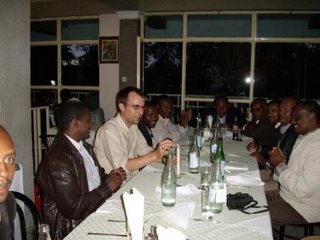 My official welcome-to-Debub-Ethiopia-College meal in Pinna Hotel this evening
My official welcome-to-Debub-Ethiopia-College meal in Pinna Hotel this eveningMy first week as a HDL. I was taken to visit two schools this morning by Mesfin, a teacher educator and the college timetabler. Both were government schools which teach 1st and 2nd cycle (Grades 1 – 4 and 5 – 8). The first school had 2600 pupils and the second more than 3000, both on sites that would easily fit onto part of the school playing field in my previous school. The classrooms looked to me as if they had been bombed. Most of the windows contained broken glass, the rooms were filthy and the walls were completely bare. The smallest class had 71 pupils in a room that was actually smaller than the lab at taught in at Rickmansworth School. Each school had a “pedagogical resources” centre where staff and pupils who make resources store them for others to use. Both rooms contained an amazing collection of handmade models of equipment the pupils (and staff) will never see, such as a microscope made out of cardboard. There were English language posters of human anatomy which were pre-second world war and still in use. One of the schools had managed to find some money six years ago to buy a map of Europe and the Middle East, but they could probably only afford it because the map itself dated from the 1950s! In the first school, the kids uniform was what we at home would call pale blue pajamas. Most were barefoot and some of them had to share a chair. The library in one of the schools had fewer books than I have on a shelf in my house at home. Poverty just screamed out everywhere I went, and yet pupils and teachers take education so seriously
On the way back to Debub College, Mesfin told me his school experience. He came from a rural area and went to a 1st cycle school where they had no shoes, all sat on the floor and there were over 100 pupils in a class. His parents died when he was a child and he then lived with his uncle. His uncle sent him to a private school in Addis Ababa so he had a chance of a decent education. Once he finished school he became responsible for looking after his two sisters. He got a degree (in English) and now teaches in the college while also studying for an M.A. in the Psychology of Special Educational Needs. He is still responsible for his sisters, who live with him, and he divides his salary between them. I feel humbled and full of respect for the many people I’ve met here who work so hard to get an education, which is their only chance of a decent life. Despite the difficulties and obligations of looking after family members, everyone here seems to have a cheerful acceptance of their lot.
When I think of schools at home, one image that pops into my head is textbooks and resources with graffiti on them or other vandalism. I would feel absolutely ashamed and embarrassed for my Ethiopian colleagues to see such things in a UK school. Having spent time in the education system of a country which is so poor and yet where education is taken so seriously, there is something particularly disgusting and morally repugnant about the waste and abuse of resources by pupils at home.

<< Home